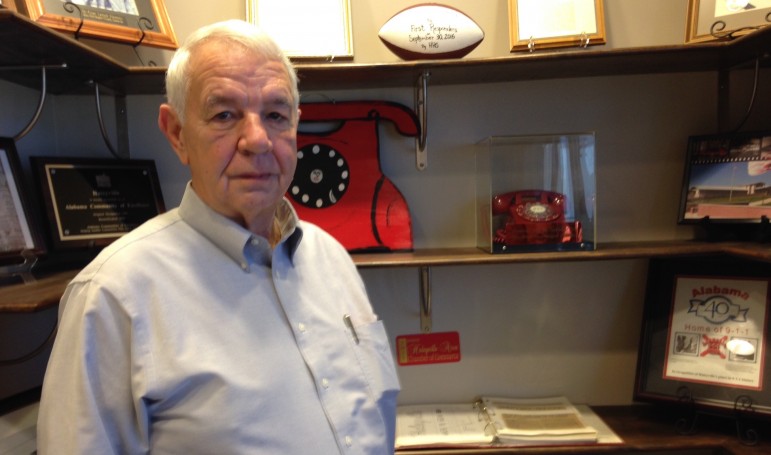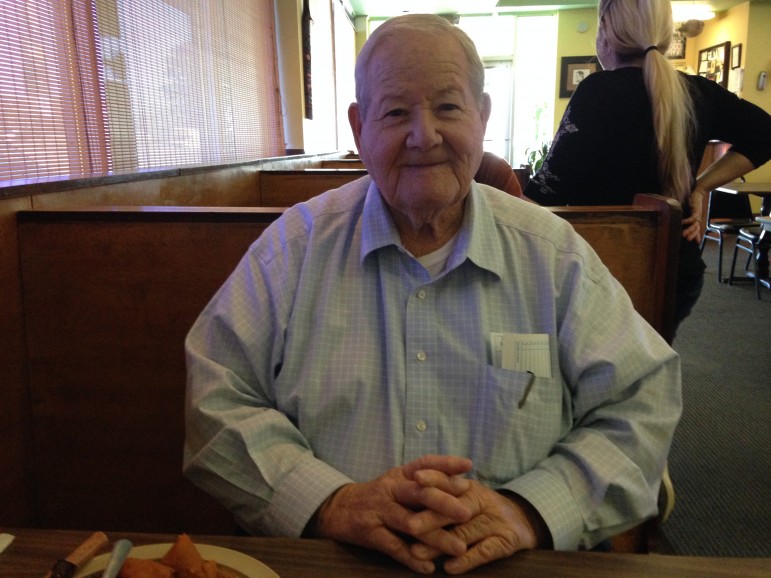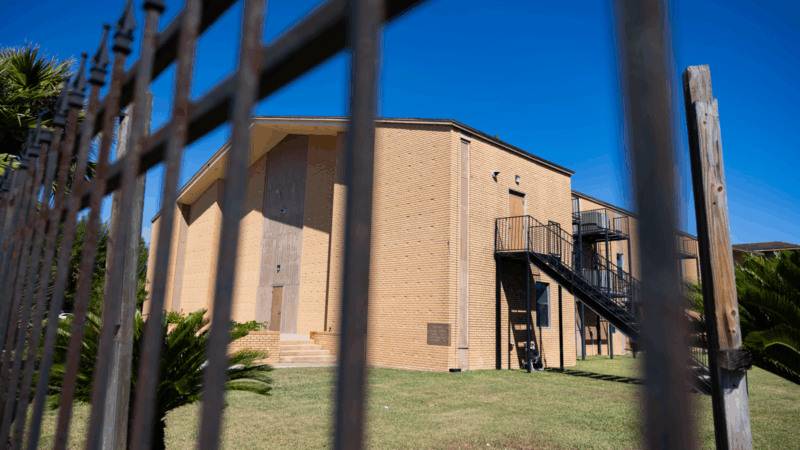How a Small Alabama Town Pioneered the First 9-1-1 Call
In an emergency, you call 9-1-1. It’s drilled into us from a young age. But it wasn’t always that way. In fact, the first 9-1-1 call was only made 50 years ago this month in Haleyville.
The town in rural northwest Alabama doesn’t hold back on championing its claim to fame.
A sign near the highway south of town declares “Haleyville – Where 9-1-1 Began.” Banners hanging from street lights bear the town seal with a red phone receiver and the words “Home of 9-1-1.”
Then, just inside city hall is a clear case holding the red rotary phone that took the first 9-1-1 call. It’s surrounded by proclamations and related newspaper clippings.
Haleyville Mayor Ken Sunseri says the phone gets eight to ten visitors a week, particularly from 9-1-1 dispatchers. He says it means a lot to the town, too.
“I think there’s a great deal of pride in it,” says Sunseri. “We have influenced the entire world.”
But bringing that first call to Alabama meant the little guy sneaking across the finish line.
In the 1960s, a federal commission on crime recommended telephone companies develop a single phone number to call for emergencies. A couple of countries had already created three-digit systems like this.
“AT&T actually responded to the report and they came out with the designation of the three numbers to use would-be 9-1-1,” says Mary Boyd, a former president of the National Emergency Number Association.
The president of the Alabama Telephone Company, Bob Gallagher, read about the decision and was upset independent carriers were left out of the conversation. So he had an idea. He took it to the company’s owner, as he explained to NPR in 2008.
“I told him I think we can do a 911 system and beat AT&T out,” said Gallagher. “And he said go get him. And off we went.”
Gallagher knew he had to act fast to pull it off. The company picked Haleyville because they were already working there so it was easy to install the system. It took less than a week.
Then on February 16, 1968, the red phone rang for the first time. It was a ceremonial 9-1-1 call between Alabama Congressman Tom Bevill and Alabama House Speaker Rankin Fite. But Mary Boyd says it represents something huge. Before 9-1-1, people with emergencies sometimes had to call multiple numbers until they found the right one.
“So if you’re having a heart attack, that’s not what you want,” says Boyd. “Haleyville … set the course for other communities to see it could be done.”
Ronnie Wilson answered the phone at Haleyville 9-1-1 dispatch for almost 20 years. Wilson remembers one call when a woman’s baby was choking and turning blue.
“I told her to place the baby in your lap upside down. With two fingers mash in the small of their back. And press them gently, up and down,” says Wilson.
A moment later he heard the baby cry.
“I knew then that we was home free,” Wilson says. “And then she just grabbed the phone, says ‘Oh, I love you!’ and hung up.”
Wilson says calls like that are very rewarding. But there were other cases when he knew immediately he’d have to call the coroner. It’s the nature of the business, he says.
The red phone that took the first 9-1-1 call is on tour to Washington, DC for a celebration marking the anniversary. But it’ll be back in Haleyville for the town’s annual 9-1-1 festival in June.
Voting nears to a close in Texas primary that may be crucial to control of the Senate
The GOP and Democratic primaries mark a potential litmus test for what direction base voters want their parties to go ahead of midterm elections this fall that will determine power in Congress.
Pregnant migrant girls are being sent to a Texas shelter flagged as medically risky
Government officials and advocates for the children worry the goal is to concentrate them in Texas, where abortion is banned.
The 2026 World Cup faces big challenges with only 100 days to go
Will Iran compete? Will violence in Mexico flare up? And what about funding for host cities in the U.S.? With only 100 days left before it beings, the 2026 World Cup in North America is facing a lot of uncertainty.
A glimpse of Iran, through the eyes of its artists and journalists
Understanding one of the world's oldest civilizations can't be achieved through a single film or book. But recent works of literature, journalism, music and film by Iranians are a powerful starting point.
Mitski comes undone
She may be indie rock's queen of precisely rendered emotion, but on Mitski's latest album, Nothing's About to Happen to Me, warped perspectives, questionable motives and possible hauntings abound.
This quiet epic is the top-grossing Japanese live action film of all time
The Oscar-nominated Kokuho tells a compelling story about friendship, the weight of history and the torturous road to becoming a star in Japan's Kabuki theater.








